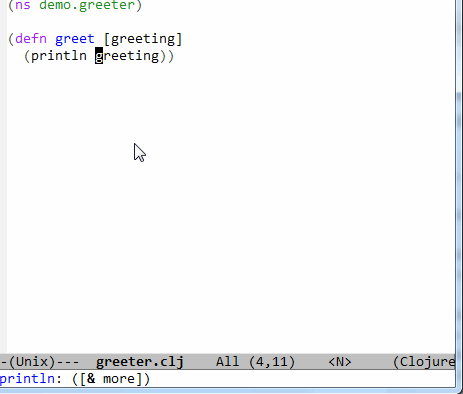clojure-emacs / Clj Refactor.el
Programming Languages
Labels
Projects that are alternatives of or similar to Clj Refactor.el
clj-refactor.el
clj-refactor provides refactoring support for Clojure projects. It complements
the refactoring functionality you'd find in clojure-mode and CIDER.
Here's a small teaser, helping you add a missing libspec:
Installation
It's highly recommended to install clj-refactor through package.el.
It's available on MELPA and MELPA Stable:
M-x package-install clj-refactor
Setup
(require 'clj-refactor)
(defun my-clojure-mode-hook ()
(clj-refactor-mode 1)
(yas-minor-mode 1) ; for adding require/use/import statements
;; This choice of keybinding leaves cider-macroexpand-1 unbound
(cljr-add-keybindings-with-prefix "C-c C-m"))
(add-hook 'clojure-mode-hook #'my-clojure-mode-hook)
The more advanced refactorings require our nREPL middleware
refactor-nrepl. From
version 2.2.0 onwards if cider-jack-in is used it is injected
automatically.
profiles.clj or profile.boot don't need to be modified anymore for the above usecase!
On the other hand if a standalone REPL or an embedded nREPL server is used you will need to manually add this dependency (see below).
Either in your project's project.clj or in the :user
profile found at ~/.lein/profiles.clj:
:plugins [[refactor-nrepl "2.5.0"]
[cider/cider-nrepl "0.24.0"]]
Check out the much longer installation page in the wiki for a less opinionated approach.
clj-refactor has quite a few settings you can tweak to change the
behavior of various commands. You can read more about that
here.
Compatibility
| clj-refactor | refactor-nrepl | CIDER | Clojure | Java |
|---|---|---|---|---|
| 2.4.0 | 2.4.0 | 0.17, 0.18 | 1.7+ | 8+ |
| 2.5.0 | 2.5.0 | 0.24 | 1.8+ | 8+ |
Middleware
Most users will not need to worry about this, but if you wish to configure middleware yourself, the name of the middleware is:
refactor-nrepl.middleware/wrap-refactor
Unlike cider-nrepl which defines many middleware with a handful of related
ops, refactor-repl defines a single middleware which houses all of the provided nREPL
ops.
In case refactor-nrepl is used for advanced (AST-based) refactorings
The analyzer
refactor-nrepl uses needs to eval the code too in order to be able
to build the AST we can work with. If that causes side effects like
writing files, opening connections to servers, modifying databases,
etc. performing certain refactoring functions on your code will do
that, too.
By default the user is warned about this when an AST dependent feature
is invoked. If this warning is an annoyance and the project can be
evalled without any risks set cljr-warn-on-eval to nil so
cljr-eagerly-build-asts-on-startup can take effect.
We create ASTs for all the namespaces at REPL start up if
cljr-warn-on-eval is set to nil. If that is not desired set
cljr-eagerly-build-asts-on-startup to nil in your emacs
configuration. AST dependent features at the moment are find usages,
rename symbol, extract function, inline symbol, rename file or dir, change function signature, promote function.
Usage
All functions in clj-refactor have a two-letter mnemonic
shortcut. E.g. rs for cljr-rename-symbol. Given the prefix choice
in the example setup you'd call this function by hitting C-c C-m rs
See the wiki for a complete list of available refactorings, demonstrations and customization points.
If you're having trouble remembering the mnemonic shortcuts, check out the hydra powered popup menus. They are described here.
Changelog
An extensive changelog is available here.
Contribute
Yes, please do. There's a suite of tests, so remember to add tests for your specific feature, or we might break it later.
You'll find the repo at:
https://github.com/clojure-emacs/clj-refactor.el
To fetch the test dependencies, install cask if you haven't already, then:
$ cd /path/to/clj-refactor
$ cask
Run the tests with:
$ make test
Before submitting a patch, or a pull request, make sure all tests are passing and that your patch is in line with the contribution guidelines.
Thanks to everyone who's contributed so far!
Get Help
Due to clj-refactor's kinship with CIDER, you can get help for it in most CIDER-related support channels.
Discord
CIDER has its own Discord chat server, created by CIDER's author Bozhidar. You can join the Discord server https://discord.com/invite/nFPpynQPME[here].
Slack
CIDER has an official https://clojurians.slack.com/[Clojurians
Slack] - #cider. The channel is very active and is a great way to
get a handle on some of the maintainers and interact with other CIDER/clj-refactor
users. If you need an invite you can go http://clojurians.net/[here].
There's also another channel named #emacs for generic Emacs discussions.
License
Copyright © 2012-2014 Magnar Sveen Copyright © 2014-2021 Magnar Sveen, Lars Andersen, Benedek Fazekas, Bozhidar Batsov
Author: Magnar Sveen [email protected] Lars Andersen [email protected] Benedek Fazekas Keywords: convenience, clojure, cider
This program is free software; you can redistribute it and/or modify it under the terms of the GNU General Public License as published by the Free Software Foundation, either version 3 of the License, or (at your option) any later version.
This program is distributed in the hope that it will be useful, but WITHOUT ANY WARRANTY; without even the implied warranty of MERCHANTABILITY or FITNESS FOR A PARTICULAR PURPOSE. See the GNU General Public License for more details.
You should have received a copy of the GNU General Public License along with this program. If not, see http://www.gnu.org/licenses/.

